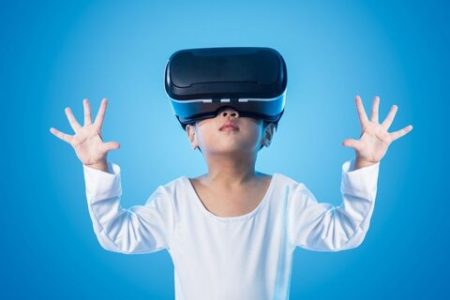Step into a world where reality blends seamlessly with imagination. Virtual Reality (VR) technology has revolutionized the way we interact with our surroundings, and its impact on various industries cannot be ignored. In the realm of B2B manufacturing sales, VR has emerged as a game-changer, offering unparalleled advantages that have transformed the landscape for manufacturers worldwide.
Imagine being able to showcase your products in a virtual environment, allowing potential buyers to not only see but also experience them in an immersive and interactive manner. With VR technology, this is now possible – opening up endless possibilities for B2B manufacturers looking to enhance their sales strategies.
We will delve into the benefits of using VR in B2B manufacturing sales and explore real-life case studies of successful implementation. Get ready to enter a new dimension where innovation meets profitability!
Benefits of VR for B2B manufacturers
Virtual Reality (VR) technology has revolutionized the way B2B manufacturers conduct sales and engage with their clients. The benefits of VR in this industry are numerous, offering a wide range of advantages to manufacturers looking to enhance their sales process.
VR provides enhanced product visualization capabilities that allow manufacturers to showcase their products in a more immersive and interactive manner. By creating virtual environments, potential buyers can experience the product in a realistic setting, enabling them to better understand its features and benefits. This level of visual representation enhances customer engagement and helps build trust between the manufacturer and buyer.
VR enables manufacturers to offer customization options for their products. Through virtual reality simulations, customers can personalize various aspects of the product such as color, size, or configuration. This not only gives buyers a sense of ownership but also allows them to visualize how the customized product will look before making a purchase decision.
VR eliminates geographical limitations by providing remote collaboration capabilities. Manufacturers can now connect with clients from anywhere in the world without having to physically visit their location. This saves time and resources while still providing an immersive sales experience.
Case studies have shown successful implementation of VR in B2B manufacturing companies across different sectors. For example, automotive manufacturers have used VR to create virtual showrooms where customers can explore car models without physical inventory present at dealerships. Similarly, construction equipment manufacturers have utilized VR technology for training purposes by simulating real-world scenarios for operators.
Looking ahead into the future of B2B manufacturing sales, it is clear that Virtual Reality will continue playing an essential role in transforming traditional selling approaches into more engaging experiences for both buyers and sellers alike.

Enhanced Product Visualization and Customization
One of the key advantages of virtual reality (VR) technology in B2B manufacturing sales is the ability to provide enhanced product visualization and customization options. Traditional methods of showcasing products through brochures or static images can often fall short, leaving potential buyers with limited understanding or imagination of how a product will actually look or function.
With VR, manufacturers can bring their products to life in a virtual environment, allowing customers to experience them firsthand before making a purchase decision. Through immersive 3D models and interactive simulations, users can explore every aspect of a product, manipulate its components, and even test out different configurations.
VR enables customizable features that cater to specific customer requirements. By integrating real-time customization capabilities into the VR experience, manufacturers empower buyers to personalize products according to their unique needs. This level of interaction not only enhances customer satisfaction but also streamlines the sales process by eliminating uncertainties and reducing back-and-forth communication between manufacturer and buyer.
VR allows for collaboration between manufacturers and clients during the design phase. Instead of relying solely on technical drawings or prototypes that may be difficult for non-technical stakeholders to comprehend fully, VR provides an intuitive platform for participants from various departments or organizations to view designs together in real-time. This collaborative approach fosters better communication among team members while ensuring everyone has a clear understanding of the final product’s specifications.
Enhanced product visualization and customization through virtual reality empowers B2B manufacturers with a powerful tool for engaging customers on a deeper level. By providing immersive experiences that go beyond traditional marketing materials alone, businesses can differentiate themselves from competitors while building trust with potential buyers who feel more confident about their purchasing decisions.
Case studies of successful implementation in B2B manufacturing companies
Let’s dive into some real-life examples of how virtual reality (VR) has been successfully implemented in the B2B manufacturing sector. These case studies showcase the tangible benefits that VR brings to manufacturers and their sales processes.
One such example is a leading machinery manufacturer that incorporated VR technology into their sales strategy. By creating immersive product experiences, they were able to provide potential customers with a virtual walk-through of their equipment. This allowed buyers to visualize the machinery in action, understand its features and functionalities, and make more informed purchasing decisions.
In another instance, an automotive parts supplier utilized VR to enhance their customization process. With VR simulations, customers could virtually customize different components according to their specific requirements. This not only saved time but also enabled the company to showcase a vast range of options without having physical samples for each variation.
A third case study involves a construction equipment manufacturer that used VR as part of its training program for operators. Through realistic simulations, trainees could practice operating heavy machinery in various scenarios before stepping foot on an actual worksite. As a result, this approach significantly reduced training costs while ensuring operators were well-prepared and confident on the job.
These success stories demonstrate how B2B manufacturing companies have leveraged VR technology to transform their sales processes, improve customer engagement and satisfaction, increase operational efficiency, and ultimately drive business growth.
The implementation of virtual reality has proven effective across industries within the B2B manufacturing sector – from machinery manufacturers to suppliers and even construction equipment companies. As technology continues to advance at a rapid pace, we can expect even greater integration of VR into these businesses’ operations.
By embracing virtual reality solutions tailored specifically for B2B manufacturing needs, companies can stay ahead of competitors by offering unique selling propositions through enhanced product visualization capabilities or streamlined customization processes that traditional methods cannot match up against.
Future of VR
As the world continues to embrace technological advancements, it is clear that virtual reality (VR) has a promising future in B2B manufacturing sales. With its ability to enhance product visualization and customization, VR is revolutionizing the way manufacturers engage with their clients.
Going forward, we can expect even more innovative uses of VR in the manufacturing industry. As technology improves and becomes more accessible, manufacturers will have greater opportunities to leverage VR for sales and marketing purposes. This means that companies can continue to refine their customer experiences by providing immersive and interactive product demonstrations.
As VR hardware becomes more affordable and user-friendly, it will become easier for businesses of all sizes to adopt this technology. This opens up new possibilities for smaller manufacturers who may not have had the resources or space for physical showrooms or extensive travel budgets.
Advances in 3D modeling software and augmented reality (AR) integration will further enhance the capabilities of VR technology. Manufacturers will be able to create even more realistic simulations that allow customers to interact with products on a whole new level.
As remote work becomes increasingly prevalent due to global events such as pandemics or natural disasters, VR offers an opportunity for manufacturers to bridge the gap between distance and interaction. By enabling virtual meetings and collaborative sessions within a shared digital environment, teams from different locations can come together seamlessly.
The future of virtual reality in B2B manufacturing sales is bright. With its numerous benefits such as enhanced product visualization and customization capabilities, successful case studies already emerging from leading companies in various industries serve as proof of concept.
As technology continues to evolve rapidly at an ever-accelerating pace, it’s only a matter of time before virtual reality becomes an essential tool for every manufacturer looking to stay ahead in today’s competitive market. Embracing this transformative technology now will position businesses at the forefront of innovation while delivering exceptional customer experiences that drive sales growth.



